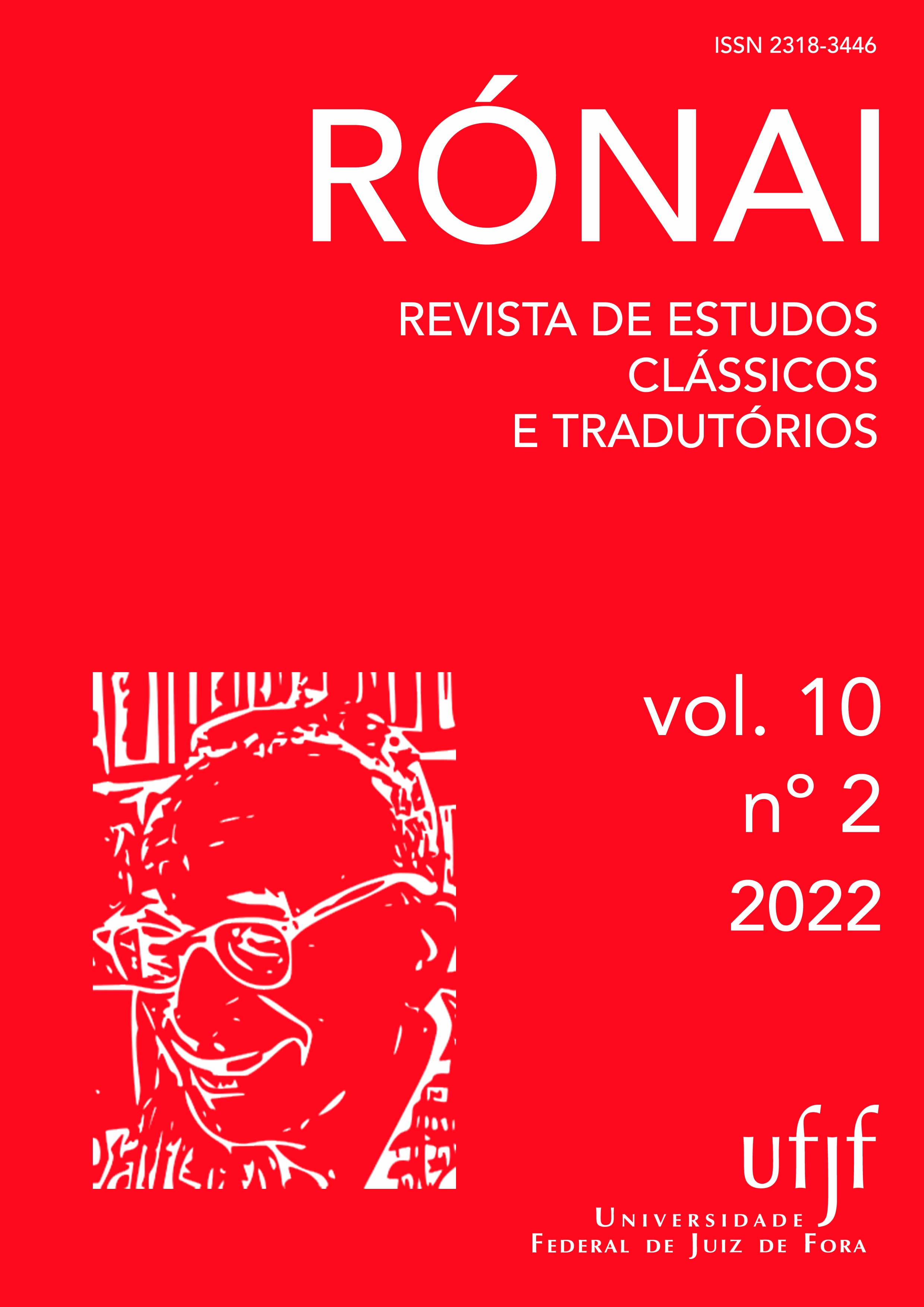A tragédia de Dido e sua função na Eneida
DOI:
https://doi.org/10.34019/2318-3446.2022.v10.38647Palavras-chave:
Eneida IV, Dido, tragédiaResumo
Uma tradição milenar de comentadores da Eneida demonstrou que o Livro IV contém elementos de outros gêneros que não o épico-heroico e que episódio de Dido é como uma tragédia dentro de uma epopeia. O intuito deste artigo é rediscutir alguns dos elementos trágicos que caracterizam a personagem e o episódio de Dido e posteriormente tratar, em termos de mistura genérica, da função dessa “tragédia” na totalidade do poema. A análise de trechos dos livros I e IV mostrou que a representação do destino individual e trágico de Dido contribui para o argumento imperialista da Eneida no sentido em que revela a inevitabilidade do curso dos Fados em direção à fundação de Roma, contra o qual os opositores, como Dido, não podem obter sucesso. Finalmente, esclarecer-se-á que esta leitura não é incompatível com a assim chamada “polifonia” da Eneida.
Downloads
Referências
ALBRECHT, M. von. Inuentio II: Turnus, a Tragic Hero? Virgil and Aristotle. In:
ALBRECHT, M. von. Roman epic: an interpretative introduction. Leiden; Boston; Köln: Brill, 1999. p. 120-122.
ANDRÉ, C. A. Morte e vida na Eneida. Humanitas, Coimbra, v. 35/36, p. 105-148, 1984.
AUSTIN, R. G. P. Vergili Maronis Aeneidos Liber Quartus. Oxford: Oxford University Press, 1966.
CAIRNS, F. Virgil’s Augustan Epic. Cambridge: Cambridge University Press, 1989.
CAMPS, W. A. An introduction to Virgil’s Aeneid. London: Oxford University Press, 1969.
CHAUÍ, M. A escola do pórtico. In: CHAUÍ, M. Introdução à história da filosofia: as escolas helenísticas. Vol. 2. São Paulo: Companhia das Letras, 2010. p. 112-168.
CONTE, G. B. Generi e lettori: Lucrezio, l’elegia d’amore, l’enciclopedia di Plinio. Milano: Mondadori, 1991.
CONTE, G. B. The rhetoric of imitation. Ithaca; London: Cornell University Press, 1986.
DeWITT, N. W. The Dido episode as a Tragedy. The Classical Journal, v. 2, n. 7, p. 283-288, 1907.
GARSTANG, J. B. The Tragedy of Turnus. Phoenix, v. 4. n. 2, p. 47-58, 1950.
HARDIE, P. Virgil’s Aeneid: cosmos and imperium. Oxford: Oxford University Press, 1986.
HARRISON, S. J. Generic Enrichment in Vergil and Horace. Oxford: Oxford University Press, 2007.
HEINZE, R. Virgils Epische Technik. Stuttgart: Teubner, 1965 [1903].
HIGHBARGER, E. L. The Tragedy of Turnus: A Study of Vergil, Aeneid XII. The Classical Weekly, v. 41, n. 8, p. 114-124, 1948.
KÖHLER, E. Gattungssystem und Gesellschaftssystem. In: HAUPT, B. (org.). Zum mittelalterlichen Literaturbegriff. Darmstadt: Wissenschaftliche Buchgesellschaft, 1985. p. 111-129.
MACROBIVS, A. T. Saturnalia. Edição: Iacobus Willis. Stuttgart; Leipzig: Teubner, 1994.
MARTINS, P.; RODRIGUES, M. M. L. A Elegia no Livro IV da Eneida. Codex – Revista de Estudos Clássicos, v. 5, n. 2, p. 91-108, 2017.
MOLES, J. L. Aristotle and Dido’s Hamartia. Greece & Rome, v. 31, n. 1, p. 48-54, 1984.
MONTI, R. C. The Dido Episode and the Aeneid. Coleção Mnemosyne, Vol. 66. Leiden: Brill, 1981.
MUECKE, F. Foreshadowing and Dramatic Irony in the Story of Dido. The American Journal of Philology, v. 104, n. 2, p. 134-155, 1983.
PEASE, A. S. Publi Vergili Maronis Aeneidos Liber Quartus. Cambridge (MA): Harvard University Press, 1935.
PANOUSSI, V. Virgils “Aeneid” and Greek Tragedy. Cambridge: Cambridge University Press, 2009.
QUINN, K. Virgil’s Tragic Queen. In: QUINN, K. Latin Explorations: Critical Studies in Roman Literature. London: Routledge and Kegan Paul, 1963. p. 29-58.
ROSSI, L. E. I generi letterari e le loro leggi scritte e non scritte nelle letterature classiche. Bulletin of the Institute of Classical Studies, v. 18, p. 69-94, 1971.
RUDD, N. Idea: Dido’s Culpa. In: RUDD, N. Lines of Enquiry: Studies in Latin Poetry. Cambridge: Cambridge University Press, 1976.
SERVIVS GRAMMATICVS. Aeneidos Librorum I-V Commentarii. Edição: Georgius Thilo. Leipzig: Teubner, 1881. Vol. 1.
SWANEPOEL, J. Infelix Dido: Vergil and the notion of the tragic. Akroterion, v. 15, p. 30-35, 1995.
THAMOS, M. As armas e o varão: leitura e tradução do Canto I da Eneida. São Paulo: Edusp, 2011.
THORNTON, A. H. F. The Problem of Free Will in Virgil’s Aeneid. JAULA, v. 61, n. 1, p. 5-19, 1984.
VASCONCELLOS, P. S. Efeitos intertextuais na Eneida de Virgílio. São Paulo: Humanitas; FAPESP, 2001.
VIRGÍLIO. Eneida. Tradução: Carlos Alberto Nunes [edição bilíngue]. Comentários: João Angelo Oliva Neto. 2. ed. São Paulo: Editora 34, 2016.
Downloads
Publicado
Como Citar
Edição
Seção
Licença
Copyright (c) 2022 Miguel Ângelo Andriolo Mangini

Este trabalho está licenciado sob uma licença Creative Commons Attribution 4.0 International License.
Direitos Autorais
Autores que publicam nesta revista concordam com os seguintes termos:
1. Autores e autoras mantém os direitos autorais e concedem à revista o direito de primeira publicação, sendo a publicação licenciada sob a Creative Commons Attribution License 4.0 Internacional.
2. Os autores e autoras têm permissão e são estimulados(as) a publicar e compartilhar o trabalho com reconhecimento da publicação inicial nesta revista.
3. Os autores e autoras dos trabalhos aprovados autorizam a revista a ceder o conteúdo de seus trabalhos, após sua publicação, para reprodução em indexadores de conteúdo, bibliotecas virtuais e similares.
Para mais informações sobre a Creative Commons Attribution 4.0 International License, acessar: https://creativecommons.org/licenses/by/4.0/
Isenção editorial
O conteúdo dos artigos publicados é de inteira e exclusiva responsabilidade de seus autores, não representando a posição oficial da Rónai - Revista de Estudos Clássicos e Literários ou do Faculdade de Letras da Universidade Federal de Juiz de Fora ou das instituições parceiras.



